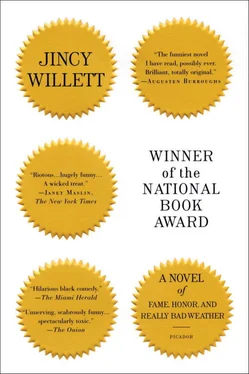“I don’t know.” Abigail chewed her thumbnail. “How’s Anna?”
“How does this contribute to the self-defense idea?”
“It doesn’t. We’re partly scrapping that, see? We’re going to say, number one, she killed him to save her life, and, but, number two, she killed him because, I don’t know, hell, everything in her past was one great big flashing arrow—”
“Insanity? Good Lord. How are you going to act like an insane person? That’s the most ridiculous thing I ever heard.”
“Uh-uh. Not insanity. Diminished responsibility.” She saw the appalled look on my face. “That’s a real defense. He says it’s our best shot.”
For a second I was derailed by the thought of Minden saying “our best shot.” “That’s an actual defense ?” I asked.
“Yup.”
“Diminished responsibility.” I started to laugh. “Kid,” I said, “you’ve got nothing to worry about.” Abigail got the joke—we’ve always laughed at the same things—and we became rowdy and the guard made me leave.
Chapter Seven
Two Creepy People

Chapter 7
The DeVilbiss Circle
Here, Readers, I must step out from behind the curtain and admit my small part in this tale. For Abigail’s story cannot be told without extensive reference to my husband, Guy DeVilbiss, whose fondness and deep admiration for Abigail Mather played no small part in what was to happen to her. And how terribly ironic, how grotesque this connection is. My brilliant, tender husband, who wished for Abigail—for all his friends, students, readers—only the richest joy. O God! that one might read the book of fate…
—————
Indeed.
Guy DeVilbiss, the poet, husband of Hilda, lover of women everywhere, is not a local poet but an actual, internationally acclaimed poet who happens to live in Frome, Rhode Island. He has always talked of how fond he is of the Community, and the Community itself is actually fond of him: they regard each other, Poet and Community, with fond incomprehension. When reporters from the Journal interview him at his home, which they do every four or five years, there is always a great deal of forelock-tugging, and an obeisant display of awed confusion on the reporter’s part, humility on the part of the Great Writer. Guy is the sort who “gazes kindly out at you through rimless glasses with a curiously childlike innocence,” for which read vacuity .
He is shiny bald, short, and pear-shaped. His skin is as white and blue-veined and paper-thin as that of an anemic young girl. His eyes are watery gray, myopic. He has an asymmetric, sensual mouth, one side of the lower lip permanently swollen, bee-stung, the upper lip thin and cruelly, subtly curved. His mouth is the only noticeably masculine aspect of him. His hands are plump, the cuffs of his long-sleeved flannel shirts always too tight, as though Hilda, who dresses him, were trying to cut off his circulation slowly over time. There is something particularly repulsive to me about the way his hands swell, wristless, painful, at the ends of his short arms, like ugly fruit.
Guy is an authentic genius artist, read by almost no one, revered in lit-crit circles. “The only postwar poet,” according to the Times, “certain to survive the millennium.” He writes about sex, and he writes about God, and he fuses the two. Sex is altar, pit, eternity, theology, the single worthy object of worship and subject of art.
He is a confessional poet. Critics call him instead the Poet of Analysis, or sometimes just The Analysand. In other words, he confesses not to a priest, not to an audience of gossip-hungry voyeurs, but to an Ideal Therapist. To say that these confessions are “intensely personal” is to understate considerably. When comprehensible they are wildly embarrassing, at least to anyone who actually knows Guy and Hilda. I can’t think what other people around here do when they have them to dinner or come to their door collecting for the Heart Association. Do they just blot out what they know?
Guy’s most celebrated collection, the fifteen-year-old Venus Accroupie, is a series of lyric descriptions of his wife’s private parts. He uses her name. He uses her body. Abby and I went swimming with her once. She really does have a small eggplant birthmark high up on the inside of her right thigh, an arrow, like a tattoo, pointing straight at her crotch. She is not, nor has she ever been, or pretended to be, an attractive woman. The arrow, Abigail says, is just as compelling as the arrow on a Band-Aid wrapper, the whole viewed prospect just as appetizing as a Band-Aid.
Guy describes her, literally warts and all, in what is for my money one of the most nauseating literary performances of all time. In one of the poems, “Werewolf,” he describes her menstrual cycle as it is manifested in changing odor. The poem is divided into twenty-eight stanzas, each one evoking, with great art, a particular smell. Such is his genius—and I don’t deny him this—that you hallucinate olfactorily. You actually reach for your handkerchief, or your gas mask.
He has graduated now from Hilda to Women Everywhere. His poems are more sexual than ever, more personal, if that is possible. Having exposed his wife to Art, he now fearlessly exposes himself. After one brief unwise glance at “Transfiguration,” I, who have seen, in my life, only one naked man, only one, could pick Guy DeVilbiss’s penis out of a police lineup.
He truly loves women, say the book jackets and the critical studies, he “literally” worships them, but not in the bad old chauvinistic way. “The Woman, to Guy DeVilbiss, is not the mysterious, unknowable ‘Other.’ [Although she is, apparently, The Woman.] ‘She is the perfect knowable,’ says DeVilbiss.” This is the rock foundation of his faith, the first and only commandment of his church. “There is no Other.”
He is the most ardent of feminists. He makes Kate Millet look like Barbara Cartland. Women with young children bore him visibly, but all other women fall into one of three categories: splendid, superb, and magnificent. “He expects so much of us,” says his adoring wife, and this is true. If Robert Lowell and Robert Graves had cross-pollinated, Guy DeVilbiss would have been the orchidaceous result.
Abigail is of course “magnificent.” (I am merely splendid.) She met Hilda first, while making her postal rounds. Guy got lots of registered mail, for which Hilda would have to sign—galley proofs, I suppose—and Hilda would engage Abigail in conversation. Abigail has never been chummy with women. She’s not catty. She just doesn’t see the point of other women.
“I think she’s hot for my body,” she told me, in the early days of the DeVilbiss courtship. This was the only explanation she could come up with for Hilda’s interest. As things turned out, it wasn’t too far off.
“What’s he like?” I asked, one evening over dinner. I’d seen pictures, of course, and read the puff pieces in the Journal-Bulletin . And I despised his poetry, while admitting his gift. You’d be an idiot not to admit his gift. But despite my contempt for his public persona and his art I could not resist a fan’s fascination with the private life of anyone who stocked my shelves. Books are holy objects to me. I can’t destroy even the awfulest of them.
In my basement, stacked in large appliance cartons, themselves stacked to the ceiling all around the boiler, a fire hazard at the very least, are all the books we couldn’t sell at discard prices—not for fifty cents, not for a quarter, not for a bag of books for a dollar. Unredeemable trash. Volume three of the outdated Rhode Island General Laws. Portuguese paperbacks, oddly sized, with brittle shiny covers depicting dark-haired women in fifties makeup, their mouths in a fifties O to signify love and lust, and with titles which translate as Painful Honeymoon and She Loved Her Doctor . The Book of Knowledge from 1928. Useless texts on physics, chemistry. Phrenology: Fact or Fancy? An autobiography of Jack Paar. Ripped bodice-rippers, Gothics with fractured spines, Young Adult novels mutilated by young adults. Forever Amber .
Читать дальше













